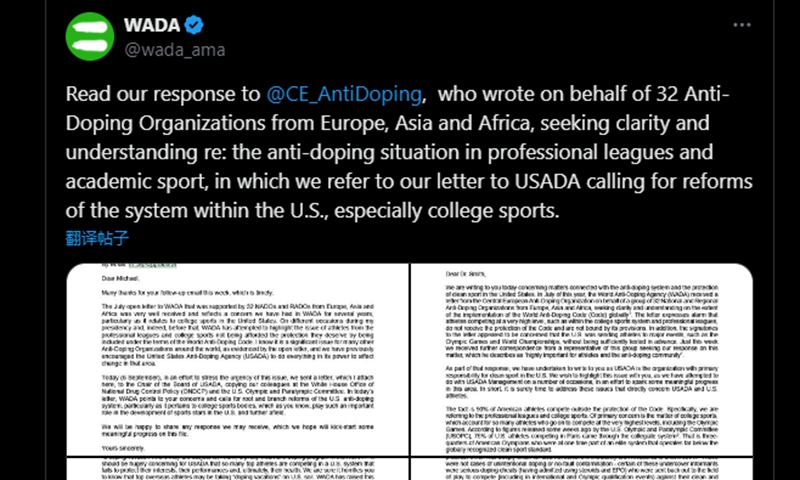
A screen cut of WADA's letter to USADA and the Central European Anti-Doping Organization
The World Anti-Doping Agency (WADA) renewed its call for comprehensive reforms in the US anti-doping system, citing growing concerns about American athletes participating in major international competitions without undergoing adequate testing.
On Monday the WADA published on its official X account a recent letter to Tobie Smith, board chair of the US Anti-Doping Agency (USADA), in which the WADA revealed that 90 percent of American athletes, particularly those in professional leagues and college sports, compete outside the jurisdiction of the World Anti-Doping Code. WADA vowed in the letter that it will continue applying the World Anti-Doping Code without fear or favor "in the face of ongoing geopolitical interference."
James Fitzgerald, head of media relations with the WADA, told the Global Times on Wednesday that USADA's CEO Travis Tygart seems to recognize that anti-doping in college sports is a joke and has even said that he wonders if foreign athletes are coming to US universities to enjoy a "doping vacation" in America.
"This is a shocking admission and it is strange that Tygart does not seem in a hurry to improve things. We feel the USADA board should lead the way and push for reforms within its anti-doping system," said Fitzgerald.
"Of primary concern is the matter of college sports, which account for so many athletes who go on to compete at the very highest levels, including the Olympic Games," the WADA said in the letter.
"75 percent of US athletes competing in Paris came through the collegiate system. That is three-quarters of American Olympians who were at one time part of an elite system that operates far below the globally recognized clean sport standard."
WADA also published a reply letter in response to a letter sent in July from the Central European Anti-Doping Organization, representing 32 National and Regional Anti-Doping Organizations from Europe, Asia, and Africa. The letter requested clarification regarding the worldwide enforcement of the World Anti-Doping Code.
In the letter to Smith, WADA reproached USADA's testing efforts as insufficient, pointing out that in 2023, USADA collected only 7,773 samples from 3,011 athletes, based on its own data. WADA deemed this figure "disappointing," considering the US population, its vast athlete base, and the size of its Olympic team.
"The French National Anti-Doping Organization (NADO) collects significantly more samples than USADA, despite having a budget that is just a little more than one-third of USADA's. USADA also collected fewer samples than the NADOs in China, Russia, Italy, and Great Britain," WADA noted.
In August, the China Anti-Doping Agency (CHINADA) called for an independent investigation into USADA's misconduct and for intensified testing on US track and field athletes to rebuild global trust in fair competition, after the USADA allowed American sprinter Erriyon Knighton to compete in the Paris Olympic Games without suspension, despite him having tested positive for banned steroid trenbolone in March.
WADA also expressed concern about the wider implications, emphasizing that the issue affects more than just US athletes. Media reports indicated that National Collegiate Athletic Association (NCAA) schools sent over 1,000 former, current, and incoming student-athletes, representing more than 100 countries and regions, to the Paris Olympic Games. Among them, 272 athletes secured 330 medals for 26 different countries and regions.
"We are sure it horrifies you to know that top overseas athletes may be taking 'doping vacations' on US soil," said WADA in the letter to Smith.
WADA also criticized USADA for allegedly operating a scheme that permitted athletes guilty of serious doping violations to go undercover and continue competing for several years. WADA viewed this practice as unfair to clean athletes.
WADA emphasized that "In the face of ongoing geopolitical interference, WADA will continue applying the World Anti-Doping Code without fear or favor, working with athletes, the sport movement, national and regional anti-doping organizations, and governments."




